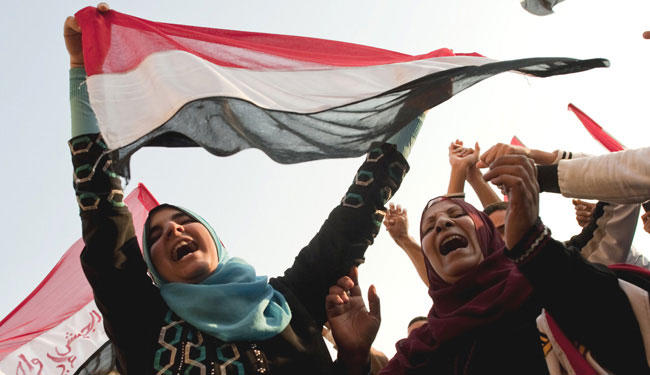A new strategic landscape is emerging in the Middle East as authoritarian states such as Russia and China attempt to use the upheaval of the Arab Spring to increase their regional influence and strengthen their efforts to pose a counterweight to U.S. power and Western norms on democracy and human rights, USIP’s Daniel Brumberg and Steven Heydemann said at a public forum on January 29.

A new strategic landscape is emerging in the Middle East as authoritarian states such as Russia and China attempt to use the upheaval of the Arab Spring to increase their regional influence and strengthen their efforts to pose a counterweight to U.S. power and Western norms on democracy and human rights, two Middle East experts from the U.S. Institute of Peace (USIP) said at a public forum on January 29.
The new dynamic is complicating the challenges facing U.S. diplomacy and raising the stakes on Washington’s ability to move nimbly on policy issues in the already volatile region, according to USIP’s Daniel Brumberg and Steven Heydemann. The two presented a paper on the topic, “ Global Authoritarians and the Arab Spring: New Challenges for U.S. Diplomacy,” at a meeting at the Woodrow Wilson International Center for Scholars in Washington. An executive summary of the “Global Author itarians” paper is also available.
Brumberg is senior adviser to USIP’s Center for Conflict Analysis and Prevention, as well as co-director of Democracy and Governance Studies at Georgetown University. Heydemann is USIP’s senior adviser for Middle East initiatives and directed its “The Day After” project, an effort to facilitate the development of a post-Assad transition plan by leading Syrian opposition figures. Their new paper and the January 29 forum were the first in a series that is being produced through a joint Wilson Center-USIP project examining the changing security architecture of the Middle East.
Heydemann described a phenomenon that he calls “the globalization of authoritarianism,” in which such authoritarian states as Russia, China and Iran have been seeking to develop a more coherent network of relations that is able to challenge Western powers in international institutions, as well as in the Middle East. This loose group of authoritarians, said Heydemann, share common objectives of defending state sovereignty and ensuring non-interference in their internal affairs—and hence they are hostile to authorizing the use of force in connection with advancing international norms on human rights and democracy, especially the “Responsibility to Protect,” or R2P, as it is called.
That dynamic became clearer with the authoritarian states’ discomfort with the strong Western military action against the Qadhafi regime in Libya and their opposition to a tougher, unified international response to the violent repression undertaken by Bashar Al-Assad’s forces in Syria. Dismayed by the West’s tough Libyan bombing campaign and its determination to oust Qadhafi, the authoritarians, said Brumberg, adopted the attitude that “we’re going to draw a line in the proverbial and literal sands and make sure it doesn’t happen again.”
Heydemann said the authoritarians are not simply aiming to play the spoiler in a shared defensive reaction; they are trying “to equalize the power asymmetry in global affairs.”
At the same time, the new governments that have come to power following the Arab Spring uprisings—though not necessarily natural allies of the authoritarians—are critical of U.S. power and U.S. policy in the region. “This opens up opportunities that these authoritarian regimes can exploit,” said Heydemann. The result, he said, is “a very direct challenge to the U.S. and its Western allies in a variety of arenas, especially in the Arab Spring arena.”
Egypt provides an important example of the opportunities that the outside authoritarian powers perceive for enlisting support in their opposition to U.S. and Western policies. Brumberg cited an August 2012 speech to the Non-Aligned Movement summit in Tehran by the new Egyptian president, Mohamed Morsi. Morsi issued a call for democracy, reflecting the popular sentiments and protests that overturned the previous regime of Hosni Mubarak and led to elections last year that brought his party to power. But Morsi also called for changes in the international political order, a sign of his discomfort with U.S. and Western clout in the current international system.
“We are dealing with a much more complicated regional and global map,” said Brumberg.
U.S. diplomacy in the Middle East and North Africa, he said, would gain strength—and room to maneuver through the region’s complex political landscape—by renewing efforts to resolve longstanding regional conflicts. That means ramping up U.S. engagement on the stalled Palestinian-Israeli dispute and the international standoff with Iran over its nuclear programs, he said.